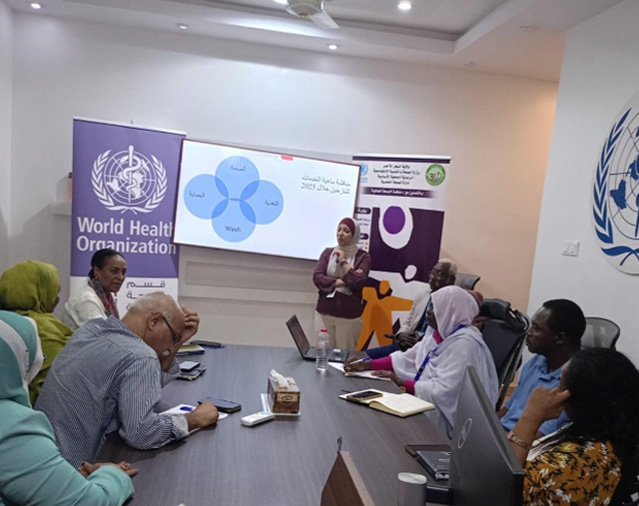19 March 2025, Port Sudan, Sudan – The war in Sudan has placed millions of people at continuous risk of displacement and violence. Many have lost their homes, livelihoods and loved ones.
Mental health and psychosocial support (MHPSS) is urgently needed, especially for children, survivors of gender-based violence (GBV) and adults facing distress. Sudan’s already fragile mental health system has nearly collapsed and there is a severe shortage of trained professionals and resources.
MHPSS is an essential component of the humanitarian response, cutting across all sectors. To strengthen MHPSS to internally displaced communities, WHO Sudan deployed MHPSS expert Ms Insherah Musa through the Standby Partnership.
 A needs assessment mission in a displacement camp in Kassala hosting a new influx of internally displaced persons, 5 November 2024. Photo credit: WHO Sudan
A needs assessment mission in a displacement camp in Kassala hosting a new influx of internally displaced persons, 5 November 2024. Photo credit: WHO Sudan
During her 6 months with WHO Sudan, Ms Musa achieved significant progress in strengthening MHPSS response efforts in Red Sea, Kassala and Gedaref states. She led field assessments in Port Sudan, Kassala and Gadaref, conducting joint assessments and coordinating with key stakeholders, and played a central role in revamping the MHPSS coordination Technical Working Group through integrating MHPSS indicators into the Humanitarian Response Plan (HRP) and revising the MHPSS Technical Working Group’s terms of reference to encompass key elements of response activities. In addition to sharing regular updates in the Health Cluster, Ms Musa also fostered strong collaboration with the Protection and GBV clusters.
To strengthen local capacity and the upskilling of health care workers to help meet the MHPSS needs of displaced and host communities, Ms Musa supported the training of 384 psychologists in Problem Management Plus (PM+), 414 psychologists in psychological first aid and 287 family doctors/psychiatrists in the Mental Health Gap Action Programme Humanitarian Intervention Guide (mhGAP-HIG).
Through these trainings and the provision of medical supplies, including psychotropic medicines, MHPSS services were successfully expanded and integrated into 21 WHO-supported primary health care centres, 12 mobile clinics and 16 centres in internally displaced persons (IDP) areas across Red Sea, Northern, River Nile and Kassala states.
Ms Musa is a licensed clinical psychologist and PhD candidate with 20 years’ experience in the field of MHPSS in emergencies, including in Jordan, Iraq, the Syrian Arab Republic and Ukraine. Palestinian by birth, Ms Musa resides in Jordan. She feels deeply about the effects of conflict and displacement on the mental health of the most vulnerable, especially women and children.
“Ensuring the availability of robust MHPSS services to communities in need is not just a call of duty for me, it is a personal calling and passion,” she says.
 Consultation meeting with the Red Sea State Ministry of Health and the Social Security Department, UN agencies and MHPSS actors at the WHO Office, Port Sudan, 12 December 2024. Photo Credit: WHO Sudan
Consultation meeting with the Red Sea State Ministry of Health and the Social Security Department, UN agencies and MHPSS actors at the WHO Office, Port Sudan, 12 December 2024. Photo Credit: WHO Sudan
During a national workshop held in Port Sudan which brought together key actors, including the Federal and state ministries of health, International Organization for Migration (IOM), the UN Refugee Agency (UNHCR) and international and local NGOs to discuss the MHPSS work plan, Ms Musa made substantive contributions.
"Despite the intensity of the assignment and vast MHPSS needs, the interaction during awareness-raising sessions and the safe space created for vulnerable participants was inspiring and motivating. It was a privilege to work alongside WHO teams and members of the national health system to improve MHPSS services as part of the health emergency response,” said Ms Musa, reflecting on her experience.
One in five people who have experienced war and conflict in the previous 10 years will develop depression, anxiety, post-traumatic stress disorder, bipolar disorder or schizophrenia.
Ensuring appropriate services are available in complex emergencies helps address a wide range of pre-existing and emerging mental health and psychosocial needs and supports the healing and rebuilding of affected communities.
Ms Musa was deployed to WHO through the Standby Partnership, with support from the Dutch Surge Support (DSS) MHPSS Programme which was established in response to the growing need for psychosocial support in emergencies and humanitarian settings. Its goal is to provide expertise in building coordination structures to enhance MHPSS capacity. Funded by the Dutch Ministry of Foreign Affairs and implemented by the Netherlands Enterprise and Development Agency, the Programme works in partnership with the Inter-Agency Standing Committee Reference Group on MHPSS in Emergency Settings.





